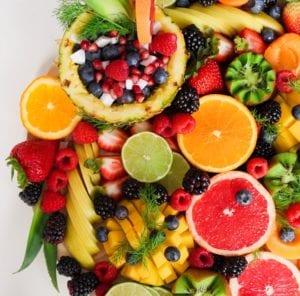Your Brain Never Sleeps!
Your brain never sleeps! It works hard 24/7, which means even when you are asleep!
Your brain is always “at work” requires a constant supply of energy, and this energy comes from the food you eat. It is, therefore, logical to realize that what is in that energy makes all the difference!
By now you know that your brain takes care of your thoughts and movements, your breathing and heartbeat, your senses, and your feelings.
In other words, what you eat directly affects the function and structure of your brain, and ultimately your mood!
Think of your brain as an expensive car. Your brain functions best when it gets only premium fuel. Eating high-quality foods that contain lots of vitamins, minerals, and antioxidants nourishes the brain and protects it from oxidative stress — these free radicals (waste) use oxygen, which can damage your cells.
What science has found is that unfortunately, just like an expensive car, is that your brain can be damaged if you ingest anything other than premium fuel. If substances from “low-premium” fuel (such as what you get from processed or refined foods) get to the brain, it has little ability to get rid of them.
Refined sugars are harmful to your brain and sugar is everywhere! Carefully look at the labels, you might be surprised! In addition to worsening your body’s regulation of insulin, they also promote inflammation and oxidative stress. Multiple studies have found a correlation between a diet high in refined sugars and impaired brain function — and even a worsening of symptoms of mood disorders, such as depression, anxiety…
Just Think of It!
Does not it make sense that if your brain is deprived of good-quality nutrition, or if free radicals or damaging inflammatory cells are circulating within the brain’s enclosed space, further contributing to brain tissue injury, consequences are to be expected?
For many years, the medical field did not fully acknowledge the connection between mood and food.
Today, it is changing! We see nutritional psychiatry acknowledging many correlations between not only what you eat, and how you behave, but also the kinds of bacteria that live in your gut!
And I would add and how you feel at the time you are eating! With Dr. Bruce H, Lipton, M.D. showing the influence of the “environment” in health-related issues, I would say the environment or your mood at the moment you are eating, has a big impact on how your body process or assimilate what you eat!
Let us look at some good food for the brain:
- Fat for the Brain. About 60% of your brain is made of fat, and half of that fat is the omega-3 kind. Omega-3 plays an important role in sharpening memory and improving mood as well as protecting your brain against decline. So, these omega-3 fatty acids are essential for learning and memory. Omega 3-s also have a couple of additional benefits for your brain, they may slow age-related mental decline and help ward off Alzheimer’s disease.
-
- For Vegetarians or Vegan people: Omega-3 can be found: in Krill Oil, Flaxseeds (ground and oil), Rapeseed/canola oil, Hempseed oil, Soya bean oil, Walnut oil, Algal oil, and Omega 6: Corn oil, Grapeseed oil, Sunflower oil, Soya bean oil, Walnut oil, Wheatgerm oil, Walnuts, Soya beans
- Fatty fish: This type of fish includes wild salmon, wild trout, and sardines, which are all rich sources of omega-3 fatty acids.
-
- Coffee is good for your brain! You might be happy to hear that, BUT to be a healthy drink, drink black expresso coffee from roasted, (not burned) arabica grains, without sugar or milk or creamer. That is the secret! Coffee used in moderation can help boost alertness and mood thanks to the caffeine and antioxidants.
- Blueberries or dark-colored berries are part of a group of plant compounds with anti-inflammatory and antioxidant effects! They provide numerous health benefits that are specifically for your brain! They are packed with antioxidants that are known to delay brain aging and improve memory!
- Curcumin, the active ingredient in turmeric, is a potent antioxidant and anti-inflammatory. Research has linked them to improve memory, and ease depression. It boosts serotonin and dopamine, which both improve mood. One study found curcumin improved depression symptoms just as much as an antidepressant over six weeks.
- Broccoli is a powerful antioxidant and has an anti-inflammatory effect, including Vitamin K, delivering more than 100% of the Recommended Daily Intake! A few studies in older adults have linked a higher vitamin K intake to better memory!
- Pumpkin Seeds contain powerful antioxidants that protect the body and brain from free radical damage. They are also an excellent source of magnesium, iron, zinc, and copper. Each of these nutrients is important for brain health. Have you heard of Pumfu replacing Tofu?
- Dark chocolate is good for your brain! I suppose you will be happy to hear that! But chose dark chocolate with NO sugar! Try the dark chocolate with stevia, I found them delicious! Researchers say that flavonoids in chocolate help with learning and memory and help slow down age-related mental decline. Several studies back this. in one study including over 900 people, those who ate chocolate more frequently performed better in a series of mental tasks, including some involving memory, than those who rarely ate it. Another study found that participants who ate chocolate experienced increased positive feelings, compared to participants who ate crackers! Chocolate is considered a legitimate mood booster, according to research.
- Nuts, Research has shown that eating nuts can improve markers of heart health, and having a healthy heart is linked to having a healthy brain! Nuts contain a host of brain-boosting nutrients, including Vitamin E. The secret, eat raw organic nuts to keep not only the healthy fat but also the plant compounds!
- Oranges, Did you know that you can get all the Vitamin C you need in a day eating one medium orange? Vitamin C is a key factor in preventing mental decline. Vitamin C is a powerful antioxidant that helps fight off the free radicals that can damage brain cells. You can also get excellent amounts of vitamin C from bell peppers, guava, kiwi, tomatoes, and strawberries to protect against age-related mental decline.
- Eggs are a good source of several nutrients tied to brain health, including vitamins B6 and B12, folate and choline that helps regulate mood and memory. Many people do not get enough choline in their diet. Eating eggs is an easy way to get choline, given that egg yolks are among the most concentrated sources of this nutrient. B vitamins have several roles in brain health. It is worth noting that there’s very little direct research on the link between eating eggs and brain health. However, there is research to support the brain-boosting benefits of the nutrients found in eggs to help slow the progression of mental decline in the elderly.
- Green tea. Like coffee, the caffeine in green tea boosts brain function and has been found to improve alertness, performance, memory, and focus. Green tea also has other components that make it a brain-healthy beverage. Its caffeine content boosts alertness, while its antioxidants protect the brain and L-theanine helps you relax!
- Pollen has been shown by research to boost blood circulation to the brain. This effect strengthens nervous system functions that are weakened when you are stressed, overworked, and depressed. This effect can help relieve symptoms of mental health conditions like decreased energy, physical weakness, and brain fog.
As we see, many foods can help keep your brain healthy. Fruits and vegetables as well as tea and coffee have antioxidants that help protect your brain from damage. Nuts and eggs contain nutrients that support memory and brain development. Pollen increases energy, physical weakness, and brain fog.
Strategically it is wise to include these foods in your diet to boost your alertness, your memory and support your brain health! Another secret, eat organic and non-GMO food as much as you can, chemical products are not good for your body!
Does Food Fights Depression?
Food, itself, does not fight depression. However, specific nutrients play a role in not only treating depression but preventing it, too. Source: rawpixel.com
7 Foods that Help with Anxiety and Stress
Food can be used as a natural remedy for anxiety, while others can send you into overdrive as research shows.
Try: Asparagus, Avocado, Blueberries, Turkey, Almond, Spinach, Salmon suggest Susan Mc Quillan. MS, RDN
We would like to share some reflections from Dr. Danielle your French Naturopath:
“These principles have helped me, my family, and thousands of people in France for my entire life.
Before starting to eat, take a few deep breaths. In less than one minute you can already have a more neutral PH that will increase the quality of your digestion. Eat light, relax when you eat, either listen to some music or have only caring, loving conversations with others. Eat seated, and if you are in a hurry, it is better to not eat! 
Eliminate processed foods, and already prepared frozen foods. Prepare your meal yourself with fresh vegetables. It is also important for digestion to have something raw at each meal. If you cannot have a simple raw, fresh green at a meal, eat some raw almonds or raw nuts. Your food should be varied, and colorful. To help with the digestion process, do not mix more than 5 different foods at the same meal. ”
Comfort foods: Eat the food that you like even if this “might not be the best for you”, once a week only, and after a while, you will see that you feel to eat “comfort food” only for rare events! Anyhow at the beginning be aware that a “Comfort food meal” should not become a habit!
Listen to yourself, if sometimes you have difficulty digesting a specific food,
- That specific food might be the problem.
- It might be the state of emotions you were in that day or when you were eating.
- The quantity ingested, or speed might be another cause of difficulty to digest.
- You might have to avoid grain or gluten?
- You always must avoid or at the very least reduce sugar to the minimum. Look at labels, sugar is everywhere. Alcohol contains lots of sugar.
- Food combining might be useful to study. If you have questions about that contact me: DrDanielle@innerOptimal.com
Disclaimer: If you have clinical food problems, contact a Nutritionist or your Doctor.
Bon Appetit! Food is here for us to live a happy and healthy life!
Dr Danielle and Marie-Laure
Call us to know more about our programs and which ones fit you the best!
All my best healing wishes to you!
You can do Brain Peak Performance/Brain training from the comfort of your home, or from anywhere you are, if you travel a lot or are always “on the go”. You can as well, if you prefer, come to our Center in Encinitas. Call us 760.633.3328 or book your complimentary consultation online: www.MyOptimalBrain.com”.
You deserve the best!


